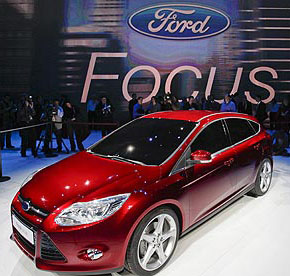US car industry rises from the ashes with debut of 'world car' at Detroit
 A Ford vehicle billed as the company’s first “world car” made its debut at the opening of a defiantly optimistic Detroit motor show, as America’s battered car industry insisted it was rising from the ashes of its worst crisis since the second world war.
A Ford vehicle billed as the company’s first “world car” made its debut at the opening of a defiantly optimistic Detroit motor show, as America’s battered car industry insisted it was rising from the ashes of its worst crisis since the second world war.Arguing that international tastes in car buying were converging, Ford launched a new version of its Focus family car. Unusually for the motor industry, it will be sold in Europe, the US, Africa and Asia with 80% uniformity in its parts.
Ford’s chief executive, Alan Mulally, said the Focus had been “designed and engineered to meet the needs of millions of buyers around the world”. Ford hopes to double annual sales of the Focus to 2m by 2012 and the model is central to a new philosophy: that global car buyers largely have the same priorities: fuel efficiency and cost-effectiveness.
An excessive emphasis on large pick-up trucks and sports-utility vehicles, and a failure to compete with nimbler Asian rivals, were key factors in the troubles afflicting Ford’s Detroit-based rivals, General Motors and Chrysler, which went bankrupt last year and needed more than $80bn (£50bn) of federal aid to stay alive.
Visiting Detroit, the US transport secretary, Ray LaHood, declared that the industry was finally showing signs of recovery and heralded the city’s annual motor show, expected to attract 700,000 visitors, as “a new beginning”.
“The auto industry is back,” said LaHood, who brushed aside protests from campaigners outside the city’s Cobo convention hall who oppose the use of public funds to prop up ailing manufacturers. “This was a good investment of taxpayer dollars in an industry that needed a little bit of an infusion of resources.”
Carmakers have been buoyed as US sales have edged up from an annualised rate of 10.4m in October to 11.2m in December.
GM, which owns brands such as Chevrolet, Cadillac, Vauxhall, Opel and Saab, recently paid back $1bn in federal aid and has pledged to return $6.7bn of its $50bn in aid by June. The US speaker of the House of Representatives, Nancy Pelosi, was due to lead a congressional delegation to see how public money is being used.
More than 700 cars are on show at Detroit’s glitzy annual event, which was kicked off by a gala charity performance headlined by a 1980s rock band, the Romantics. Among the offerings is a 1960s-style buggy concept from Mini, with an open top, four-wheel drive and removable doors, called the Beachcomber.
The world’s largest carmaker, Toyota, unveiled a hybrid-electric concept car called the FT-CH, which is a smaller version of its big-selling Prius and amounts to a fresh bet that hybrids will be a bigger draw than plug-in, pure electric cars.
Michigan state, which includes Detroit, has lobbied successfully to get carmakers to site factories making electric batteries in former carbuilding regions. The Democratic governor, Jennifer Granholm, said environmental and hi-tech jobs could help a 15% jobless rate: “We are not the rust belt any more. We’re the green belt.”Speaking to media at the show, Granholm added: “The unemployment rate in Michigan would have been a hell of a lot worse had it not been for the Obama administration’s intervention.”
Cold tea party
A year ago, union protesters rallied in the snow at the Detroit motor show to protest at the disappearance of jobs at the big three US carmakers. In a sharp turnaround, conservatives this week came to wave placards voicing anger and claiming disempowerment.
Members of a national network of anti-tax campaigners known as “tea party” activists braved sub-zero temperatures to wave US flags, sing a US civil war battle hymn and display signs opposing the Obama administration’s $80bn bailout of carmakers.
“We’re rallying for General Motors, for Detroit and for a better future for the auto industry that doesn’t involve billions of dollars of taxpayer bailouts,” said Andrew Moylan, of the National Taxpayers Union, who claims GM and Chrysler would have survived without aid. “They’ve been able to restructure [union] contracts and they would have been able to do so without a bailout.”
A shift in fortunes is palpable. Since last January, the United Auto Workers’ union has gone from protesting over jobs to taking ownership of large stakes in GM and Chrysler. At the show, the UAW leader, Ron Gettelfinger, gave short shrift to the “tea party” protesters: “Are they going to have some hot tea out there? They might need it.”
You can return to the main Market News page, or press the Back button on your browser.

